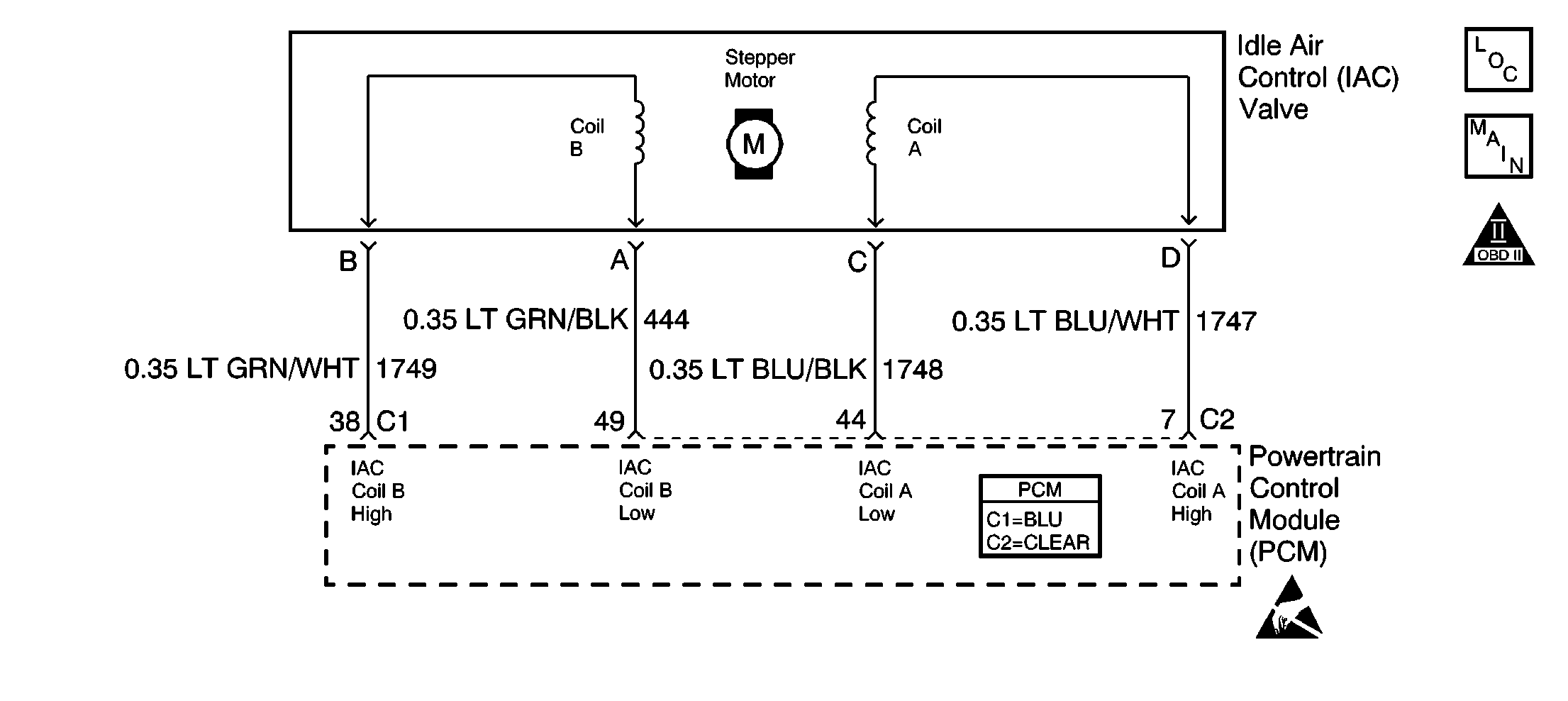
Circuit Description
The powertrain control module (PCM) controls engine idle speed by adjusting the position of the idle air control (IAC) motor pintle. The IAC is a bi-directional motor driven by two coils. The PCM pulses current to the IAC coils in steps or counts, to extend the IAC pintle into a passage in the throttle body to decrease air flow. This method allows highly accurate control of idle speed and quick response to changes in engine load.
Diagnostic Aids
Check for the following conditions:
| • | Poor connection at the PCM or IAC motor -- Inspect harness connectors for: |
| - | Backed out terminals |
| - | Improper mating |
| - | Broken locks |
| - | Improperly formed or damaged terminals |
| - | Poor terminal to wire connection |
| • | Damaged harness -- Inspect the wiring harness for damage. |
| • | Restricted Air Intake system -- Check for a possible collapsed air intake duct, restricted air filter element, or foreign objects blocking the Air Intake system. |
| • | Throttle body -- Check for objects blocking the IAC passage or throttle bore, excessive deposits in the IAC passage and on the IAC pintle, and excessive deposits in the throttle bore and on the throttle plate. |
| Check for a sticking throttle plate. Also inspect the IAC passage for deposits or objects which will not allow the IAC pintle to fully extend. |
| • | Vacuum leak -- Check for a condition that causes a vacuum leak, such as disconnected or damaged hoses, leaks at the EGR valve and EGR pipe to intake manifold, leaks at the throttle body, faulty or incorrectly installed PCV valve, leaks at the intake manifold, brake booster hose disconnected, etc. |
Reviewing the Failure Records vehicle mileage since the diagnostic test last failed may help determine how often the condition that caused the DTC to be set occurs. This may assist in diagnosing the condition.
Test Description
The numbers below refer to the step numbers on the diagnostic table.
Step | Action | Values | Yes | No | ||||||||||||
|---|---|---|---|---|---|---|---|---|---|---|---|---|---|---|---|---|
1 | Did you perform the Powertrain On Board Diagnostic (OBD) System Check? | -- | ||||||||||||||
2 |
Does Engine Speed remain within the specified value of Desired Idle for each RPM command? | ± 50 RPM | System OK | |||||||||||||
3 |
Does each node light cycle red and green, never OFF? | -- | ||||||||||||||
4 |
Did you find and correct the condition? | -- | ||||||||||||||
5 | Was a low idle symptom or rich condition noticed? | -- | ||||||||||||||
6 |
Did you find and correct the condition? | -- | ||||||||||||||
7 |
Did you find and correct the condition? | -- | ||||||||||||||
8 |
Did you find and correct the condition? | -- | ||||||||||||||
9 | Replace the IAC valve. Refer to Idle Air Control Valve Replacement . Is the action complete? | -- | -- | |||||||||||||
10 |
Did you find and correct the condition? | -- | ||||||||||||||
|
Important: The replacement PCM must be programmed. Replace the PCM. Refer to Powertrain Control Module Replacement/Programming . Is the action complete? | -- | -- | ||||||||||||||
12 |
Does Engine Speed remain within the specified value of Desired Idle for each RPM command? | ± 50 RPM | System OK |
